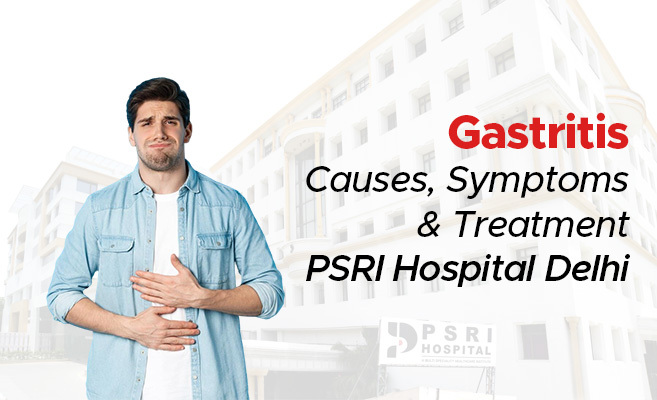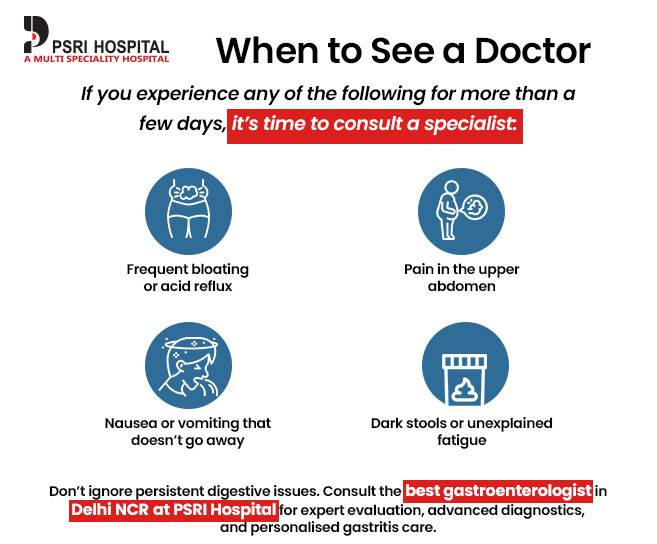Gastritis Explained: Causes, Symptoms, and Treatment

Did you know gastritis affects nearly half the global population, though many don’t realize it? This condition inflames the stomach lining, either suddenly (acute gastritis) or over time (chronic gastritis). If left unchecked, it can lead to ulcers or even gastric cancer.
If you have experienced frequent bloating, upper abdominal pain, or loss of appetite, these can be the signs of gastritis.
At PSRI Hospital, known as the best hospital in Delhi our gastroenterology team, backed by NABH accreditation, uses endoscopy, H. pylori testing, biopsy, and imaging to diagnose your condition accurately. Then we customize a plan, whether it’s acid suppression, triple or quadruple therapy, or nutritional counselling for effective gastritis treatment.
Let’s walk through the causes, symptoms, and treatments and how we support you every step of the way.
What Causes Gastritis? Understanding the Common Triggers
Many people are surprised to learn that gastritis isn’t just caused by “spicy food” or stress. It often begins quietly sometimes without symptoms and can be linked to several common and treatable causes.
Gastritis occurs when the stomach lining becomes irritated or inflamed, either from an external trigger or an internal imbalance. Here’s what often leads to that inflammation:
1. Helicobacter pylori (H. pylori) Infection
This is the most common cause of chronic gastritis worldwide. The bacteria weaken the protective mucus in your stomach, allowing acid to irritate the lining. If you do not get it treated on time, it can lead to gastric ulcers and even increase the risk of gastric cancer.
At PSRI Hospital, we perform accurate H. pylori testing through breath, stool, and biopsy-based methods as part of our gastritis diagnosis protocol.
2. Regular Use of NSAIDs
Medicines like aspirin, ibuprofen, and other non steroidal anti-inflammatory drugs (NSAIDs) can damage your stomach’s protective lining over time. These are a leading cause of erosive gastritis, especially in older adults or those taking these medications daily for joint pain or heart conditions.
3. Excessive Alcohol and Smoking
Alcohol irritates the stomach lining and increases acid production, while smoking reduces your stomach’s ability to protect itself. Over time, both habits can lead to inflammation, gastric erosion, and delayed healing.
4. Bile Reflux
Unlike acid reflux, bile reflux occurs when bile flows backward from the small intestine into the stomach. This can damage the stomach lining and mimic many symptoms of acid related gastritis.
5. Autoimmune Gastritis
Sometimes, the body’s immune system mistakenly attacks its own stomach lining, leading to autoimmune gastritis. This can interfere with vitamin B12 absorption and may cause pernicious anemia, especially in older adults.
6. Other Risk Factors
- Stress induced gastritis after surgery, trauma, or severe infections
- Corticosteroid use e.g., for asthma or arthritis
- Long gaps between meals or fasting habits
- Underlying conditions like Crohn’s disease
We take the time to understand your unique health background so we can identify the exact gastritis causes and provide the right treatment from the very start.

Recognising the Symptoms of Gastritis: What Your Stomach Might Be Telling You
Gastritis doesn’t always announce itself loudly. In fact, many people have no symptoms at all, especially in the early stages. But when symptoms do appear, they’re often mistaken for general indigestion or acidity.
Understanding the warning signs can help you seek timely care and avoid complications like ulcers or bleeding.
Common Gastritis Symptoms are:
- Upper abdominal pain or discomfort: Often described as a burning or gnawing sensation, especially after eating.
- Bloating and early fullness: Feeling overly full after small meals is a common early sign of chronic gastritis.
- Nausea and vomiting: You may feel queasy, especially in the morning or after taking medications.
- Heartburn or acidic burps: Excess stomach acid can lead to a sour taste in the mouth and discomfort in the chest.
- Loss of appetite and fatigue: Ongoing stomach irritation can suppress your hunger and leave you feeling weak.
- Black stool or blood in vomit: These are more serious symptoms that may indicate gastric bleeding and need immediate attention.
At PSRI Hospital, our gastroenterologists carefully evaluate your Gastritis symptoms and medical history. If gastritis is suspected, we recommend a step-by-step approach starting with non-invasive tests before moving to diagnostics like endoscopy or biopsy if required.
Gastritis Treatment at PSRI Hospital: Personalised and Expert Led Care
We believe that treating gastritis starts with understanding its root cause. Our experienced gastroenterologists follow a patient-first approach combining medical expertise with evidence based protocols to ensure safe and lasting relief.
Our Step-by-Step Gastritis Treatment Approach:
- Acid Suppression Therapy: Medicines like antacids, H2 blockers, and proton pump inhibitors are commonly used to reduce stomach acid and allow healing of the stomach lining.
- H. pylori Eradication: If H. pylori infection is diagnosed, we prescribe triple or quadruple therapy, which combines antibiotics with acid suppression to eliminate the bacteria effectively.
- Protective Medications: Agents like sucralfate, misoprostol, or bismuth therapy help protect the stomach lining, especially in cases of erosive gastritis or NSAID induced damage.
- B12 Supplementation: In autoimmune gastritis, patients often require vitamin B12 injections to manage deficiency and prevent long-term complications like pernicious anemia.
- Dietary and Lifestyle Modifications: Our nutritionists guide patients on avoiding trigger foods such as spicy, fried, or acidic meals. A bland diet, probiotic rich foods, and small, frequent meals are encouraged.
- Medication Review: We reassess your use of NSAIDs, corticosteroids, or any medication that might be aggravating your condition.
If you have been ignoring frequent stomach pain or indigestion, don’t wait any longer. Get evaluated by leading GI specialists at the best hospital in Delhi.
Conclusion: Expert Gastritis Care Starts with the Right Diagnosis and the Right Team!
Gastritis may start with common symptoms like bloating or acidity, but if left untreated, it can affect your overall health in serious ways. The key to recovery lies in early diagnosis, personalised treatment, and ongoing support, all of which are available under one roof at PSRI Hospital.
Here are the Reasons Why Patients Trust PSRI for Gastritis Treatment:
- Led by top gastroenterologist in Delhi NCR with decades of experience,
- Full diagnostic setup in-house: endoscopy, biopsy, H. pylori tests, imaging & labs,
- NABH & NABL accredited multispecialty hospital ensuring international quality care,
- Personalised nutrition and medication plans designed for long-term digestive health,
- Comfortable stay and easy access for patients across Delhi NCR and international guests.
Take control of your digestive health today.
Book your consultation with the best gastroenterologist in Delhi NCR at PSRI Hospital and begin your journey to lasting relief from gastritis.
FAQ’S
Can stress alone cause gastritis?
Ans. Yes, intense physical or emotional stress such as after surgery, serious illness, or trauma can trigger stress induced gastritis. This type reduces blood flow to the stomach lining, making it more prone to irritation and inflammation.
Is gastritis contagious?
Ans. Gastritis itself is not contagious, but H. pylori infection, a common cause of chronic gastritis, can spread through contaminated food, water, or close contact. Practicing good hygiene can help prevent it.
What foods should I avoid if I have gastritis?
Ans. Avoid spicy, fried, and acidic foods, as well as caffeine, alcohol, and carbonated drinks. At PSRI, our nutritionists help create personalized meal plans to reduce inflammation and support healing.
Can I have gastritis without any symptoms?
Ans. Yes, many people especially with chronic gastritis may have no noticeable symptoms. That’s why routine check-ups or tests are important if you’re at risk or have a family history of gastric issues.
How long does it take for gastritis to heal?
Ans. With proper treatment, acute gastritis can improve within a few days to weeks. Chronic gastritis may take longer and requires ongoing management. Early diagnosis at PSRI helps speed up recovery and prevent complications.

 Book An Appointment
Book An Appointment Virtual Consultation
Virtual Consultation





